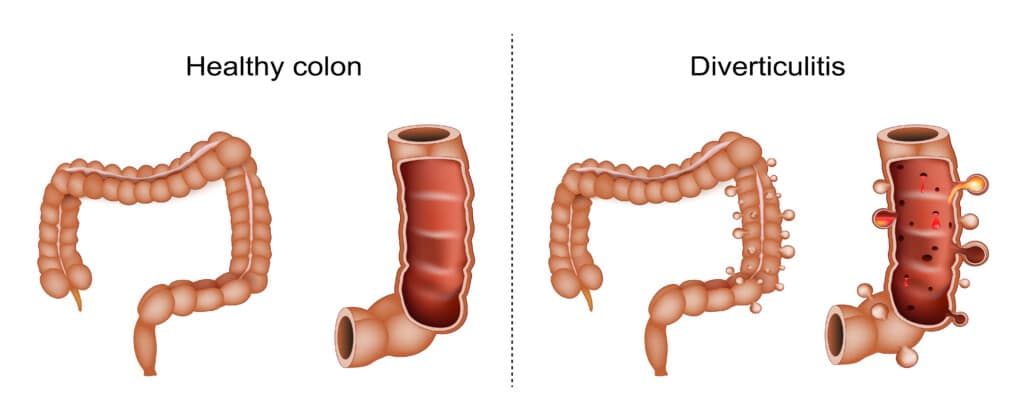WEBVTT
00:00:00.000 --> 00:00:06.000
[Speaker: Dr. Anthony Vine.]
[Visual: Dr. Vine sitting in a medical
exam office in scrubs]
[Music: Soft, inspirational music begins.]
Diverticulitis is an infection
or inflammatory condition of the colon.
00:00:06.000 --> 00:00:10.000
[Visual: diagram of a healthy colon
And a colon with diverticulitis]
And it can occur on the left or the right side,
mostly on the left side.
00:00:10.000 --> 00:00:17.000
[Visual: Dr. Vine sitting in a medical
exam office in scrubs]
Younger women can get right-sided
diverticulitis. But there are
00:00:17:000 --> 00:00:22.000
[Visual: 3D animation of the body
With diverticulitis left-sided diverticulitis.]
little outpouchings of the colon
where the blood vessels enter the wall.
00:00:22.000 --> 00:00:25.000
So there is essentially a weakness
in the wall of the colon.
00:00:25.000 --> 00:00:34.000
And you can get an infection
because the colon wall only contains
two layers of the four
00:00:34.000 --> 00:00:40.000
in a diverticulum. So a small piece of
stool that gets stuck in a diverticulum
00:00:40.000 --> 00:00:47.000
can actually erode and perforate
and cause bacteria to escape
00:00:47.000 --> 00:00:52.000
from the inside of the bowel
where it should not escape from.
00:00:52.000 --> 00:00:58.000
Diverticulitis is treated primarily
by antibiotics at first.
00:00:58.000 --> 00:01:04.000
If, however, someone has perforated
diverticulitis with what we call peritonitis,
00:01:04.000 --> 00:01:13.000
and they have infection and even fecal
material that has escaped from the colon
00:01:13.000 --> 00:01:16.000
in their abdominal cavity, then
they might need emergency surgery
00:01:16.000 --> 00:01:21.000
[Visual: Dr. Vine sitting in a medical
exam office in scrubs]
which sometimes can be done
laparoscopically, but may need
00:01:21.000 --> 00:01:24.000
to be done with old-fashioned
open surgery.
00:01:24.000 --> 00:01:25.000
[Visual: Fade to black.
Music: fades out.]
Diverticulitis
Dr. Anthony Vine offers several different options for diverticulitis treatment in NYC.
Diverticulosis is a condition caused by small pouches (diverticula) forming in the digestive tract. This typically happens in the lower portion of the intestines (sigmoid colon). Weak spots in the intestinal wall cause these pouches to develop, and while they are often asymptomatic or cause only mild symptoms, they can become inflamed or infected leading to diverticulitis. While most diverticulitis is on the left side, right-sided diverticulitis cases do occur and are seen more often in younger and middle-aged women. If left untreated, diverticulitis can lead to serious complications.

Symptoms of Diverticulitis
- Abdominal pain – typically the lower left side
- Nausea and vomiting
- Fever and chills
- Diarrhea or constipation
- Bloating and gas
- Loss of appetite
What Can Cause a Diverticulitis Flare-Up?
- Frequent constipation or straining during bowel movements
- Diet low in fiber
- Aging – more common in people over 40
- Obesity
- Sedentary lifestyle or lack of exercise
- Smoking
Managing Diverticulitis
Dr. Anthony Vine treats some of his patients with antibiotics, a liquid diet and rest. More severe cases may need hospitalization and intravenous antibiotics and can lead to complications including bowel obstruction, abscesses or perforation, requiring laparoscopic colon surgery, sometimes including a temporary colostomy bag.
Dr. Vine is an Attending Surgeon and Associate Clinical Professor of Surgery at the Icahn School of Medicine at Mount Sinai Hospital. His office is located at 1010 5th Avenue at the Laparoscopic Surgical Center of New York in New York City.
For more information on Dr. Vine’s diverticulitis treatment in NYC, please visit our Laparoscopic Colon Surgery overview

